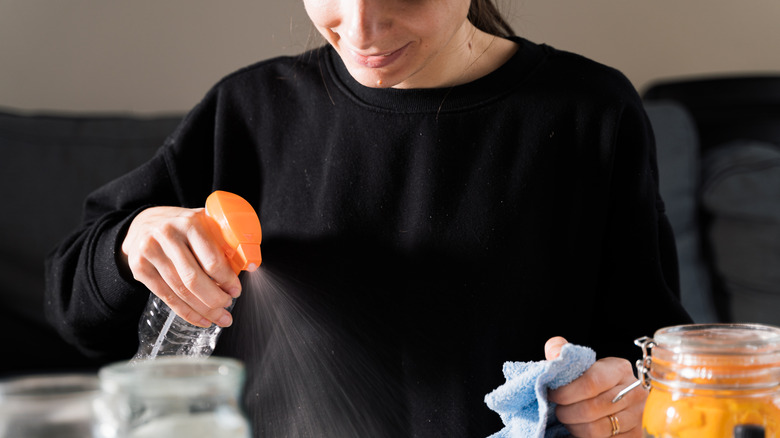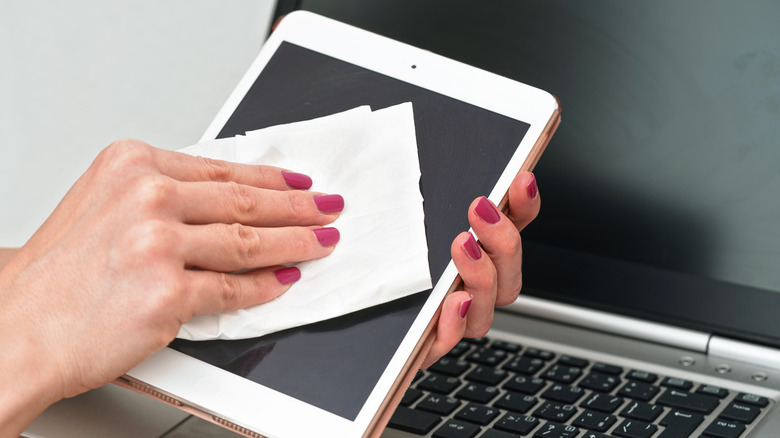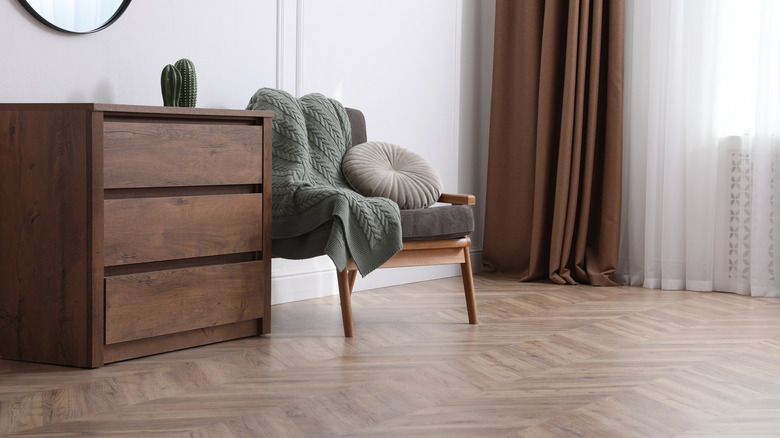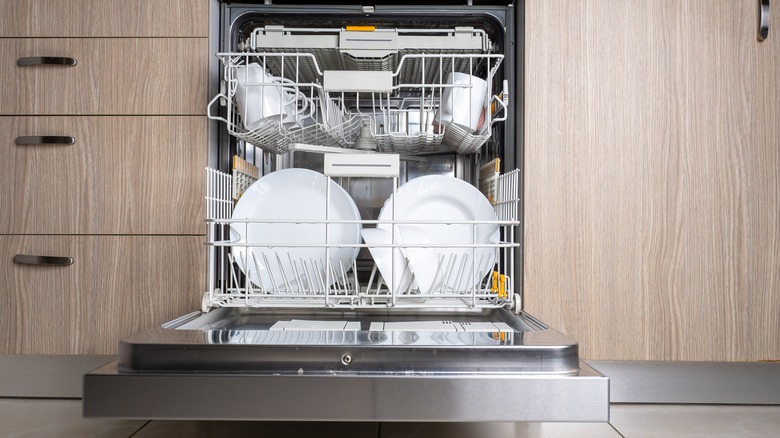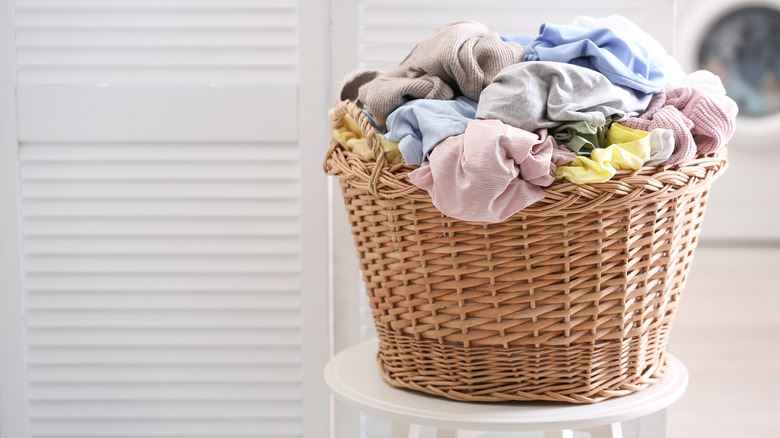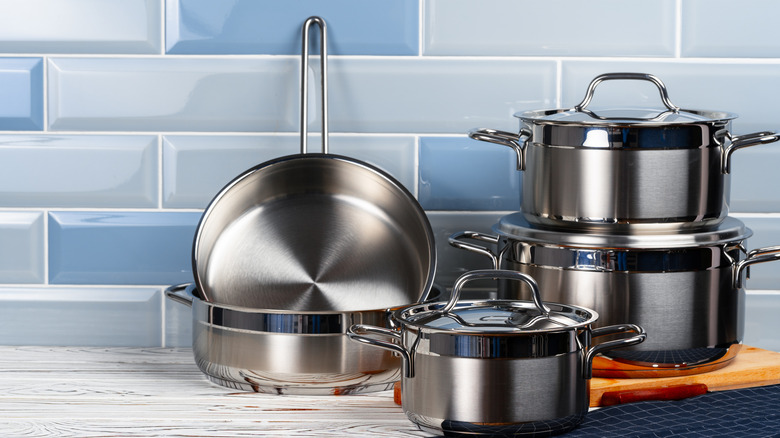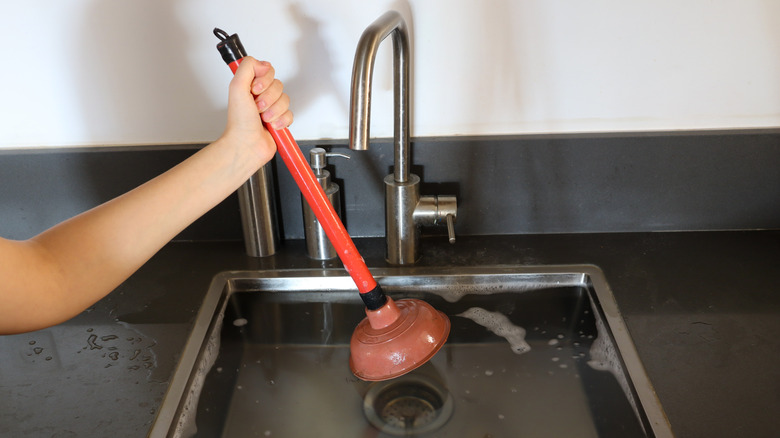7 Things You Should Never Clean With Vinegar
A common staple in most households, vinegar saves the day often. Its versatility is known for use all over the house: in cooking, washing, making health products, and of course, cleaning. Ever wondered what exactly vinegar is and how it is made? First of all, vinegar comes from vin aigre, which is French for sour wine. It was known as the poor person's wine in eras gone by, per Womersley Foods.
This fermented liquid formed from acetobacters combined with oxygen can also be made from rice, cider, and barley. It marinates meat and preserves certain foods. Apple cider vinegar may even help with weight loss and skin health. It can also catch insects in the garden, unclog toilets, and keep your surfaces sanitized and clean. While it is a multi-purpose solution, however, there are certain things in the home that can be seriously damaged with the application of vinegar. From certain appliances to certain surfaces, these are seven things you should avoid when cleaning with vinegar.
Stone countertops
Step away from the valuable stones! Granite is one of the most sought-after materials for countertops. Its beauty brings elegance and class into a room, but it is also durable and resilient to damage. Even though granite is known for its toughness, however, vinegar and the other acids contained in liquids like soda and lemon juice are harmful to the stone, according to Arch City. Similarly, vinegar is bad for marble for the same reasons. When you use vinegar on these countertops, their shiny finishes can wear off over time and dull spots can form. This process is called etching and involves discoloration and a change in texture.
To clean your granite or marble countertops the right way, substitute that vinegar spray for mild soap and a sponge or towel instead. If you happen to get vinegar or any other acids on these surfaces, quickly clean it up with water so the acid isn't given the time to work.
Electronic devices
Your laptop, phone, and tablet may not always look dirty, but they carry so many germs due to their high exposure to bacteria. In fact, a study by the University of Arizona found that our mobile phones actually have more microbes on them then our toilet seats — up to ten times more! The good thing is there are cleaning products created solely for the purpose of washing these devices. In addition to keeping them clean, they also maintain their quality. This is because the screen technology is sensitive with various features like responsiveness and anti-glare properties, as noted by Consumer Reports.
Unlike the solutions specifically intended to clean these screens, your devices will be seriously affected if exposed to vinegar because it can remove the protective coating on the screens. Known as the oleophobic, or oil-repellent, coating, it enhances smoothness and reduces fingerprint marks. Fast-drying disinfecting wipes or alcohol sprayed onto a clean cloth are also great alternatives for cleaning your devices.
Waxed wooden surfaces
Similar to granite and marble, constant use of vinegar on waxed wooden surfaces can dull the finish over time, advises Real Simple. From flooring to furniture, vinegar can leave marks and destroy the shiny coating.
If you mix the vinegar with water or use a wet mop, water left on the floor can seep through the floorboards, causing various kinds of damage from rotting to discoloration (via Electrodry). Products such as microfiber cloths with solutions made specifically to clean wood will always be your best bet. There are also hardwood cleaners that are designed to remove dirt as well as scuff marks while maintaining the quality of your wood floor. When cleaning wooden furniture, gentle wipes with damp cloths work well to lift dirt and take off any residue.
For the surfaces that have already lost their shine due to vinegar use, furniture polish can revive that shiny appearance. So, go easy on the moisture and save the vinegar spray bottle for the windows!
Dishwashers (okay, certain parts)
One use of vinegar is as a dishwasher cleaner. Architectural Digest provides a step-by-step guide to this popular process. By running a cycle with some vinegar and no dishes, you can get rid of all that food debris and soap residue. 1 or 2 cups mixed with the water provide a deep clean for the machine. And while this is a simple cleaning trick, care is needed in making sure the vinegar doesn't affect certain parts of the dishwasher. Why? The acid can react with various parts of the machine like the seals and hoses and cause them to break down or leak (via Bob Vila). Rubber or metal parts including stainless steel can also be damaged with vinegar by rust and other effects of oxidization.
Vinegar shouldn't be a frequent cleaner for dishwashers and should instead be used once in a while in order to avoid these damages. To be safe, use a dishwasher cleaner because it's designed to work in the machine and won't cause anything to break down.
Washing machines
Vinegar is used in washing machines to clean clothes as well as freshen up the machine. People appreciate being able to launder clothes without harsh chemicals that harm the environment and vinegar is a great, natural solution. It's known to loosen up soap buildup, act as a bleaching agent, eliminate odors, brighten garments, and eliminate stains. To top it all off, vinegar can be used to clean out residue by running it through the machine without any clothes. However, it isn't really effective in certain laundry situations.
Vinegar hardly helps when it comes to stains that are already set into clothing; actual laundry stain removers are more effective, as noted by Consumer Reports. Red wine, brown, and balsamic vinegar can actually stain clothing. Also, some people might be allergic, which means having it on their clothes can be a problem. When it comes to the machine, repeated use of vinegar can also cause the seals and hoses to break down or leak — similar to a dishwasher.
Steel, aluminum, and copper
When stainless steel has heavy stains or marks, vinegar is usually used to get rid of them. With distilled water, the vinegar can cause the stains to lift and be wiped off. It can also be used to shine appliances. Still, caution is necessary when using concentrated vinegar for steel, aluminum, and copper.
Vinegar can be corrosive to metals and is especially acidic at high temperatures, which is why stainless steel should never be soaked in solutions that contain vinegar. This long-term exposure can result in damage. Acidic substances can also tarnish and corrode copper almost instantly. This is why the use of copper vessels to store high-acidity foods like milk and wine is not recommended, advises Copper H20. In the same way, when vinegar makes contact with aluminum for extended periods of time without rinsing, corrosion and damage can occur.
Vinegar is often employed to clean these metals, but a lot of great care and attention to detail is needed to avoid more damage as a result of the cleaning process.
Grease
While cleaning the house, vinegar is used in almost every area. It cleans up spills, refrigerator surfaces, and the microwave in the kitchen. It takes care of bacteria in the sink, shower, tiles, and toilet in the bathroom. It's even applied to mattresses and rugs to disinfect and deal with stains.
Vinegar might be a superhero in the house, but there's one villain it can't conquer: grease. Simply put, acids aren't effective in fighting grease at all, according to CNET. So, while toilet clogs can be fixed with a baking soda and vinegar mixture, drain clogs caused by a buildup of grease or oil won't budge. Vinegar can't cut grease through because grease needs a surfactant that will make it mix with water. The good news is soap is a surfactant! Soap and hot water work great for drain clogs. Regular detergents and alkaline cleaners are better suited for tackling grease in the home as well.
